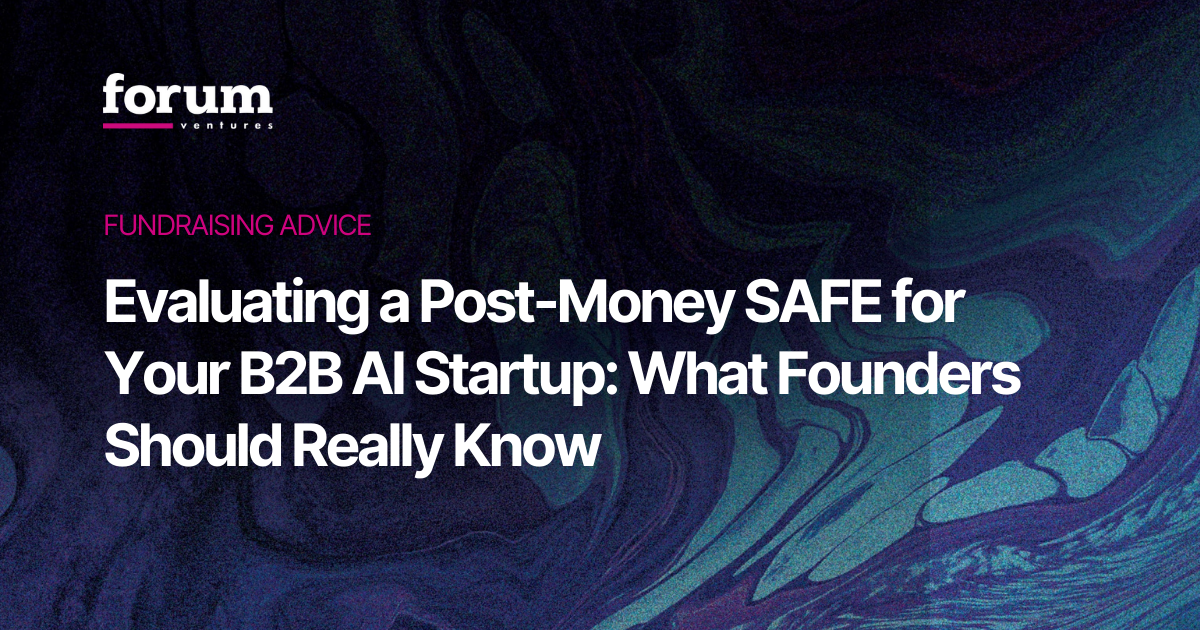Capital is key for all startups whether it's through revenue or funding pathways. The challenge with funding is that there are multiple paths to securing capital, each with its merits and pitfalls.
In a recent webinar, we had three seasoned entrepreneurs and an early-stage investor provide a comprehensive overview of both dilutive and non-dilutive funding strategies. Below are some of their key takeaways plus a deep dive into various questions regarding the fundraising journey as an early-stage SaaS founder.
- Antonio Barnes, Founder & CEO of Fridgio: "Make sure you know how much you want to raise and clearly understand whom you want to raise it from. Investors with subject matter expertise can benefit your business in the long run."
- David C. Uponi, Investor Forum Ventures: "Founders should hone in on crafting a narrative. Ultimately, you're selling VCs on a promise, and it should be your goal to prove you can deliver."
- Bobby Gilbert, Co-Founder & CEO of FundStory: "The way we fundraise is fundamentally going to change with AI, whether it's filling out applications, applying for a loan, or finding a VC that's the right fit."
- Ariel Lopez, Founder & CEO of Knac + Innovation & Technology at Invest Atlanta: "Every single founder's journey looks different. Focus on where you're at today and what milestones you need to hit, and then put the rest of the pieces of the puzzle, from cofounders to capital, together around that."
The Initial Leap: From Past Experiences to Founding Ventures
Our entrepreneur panelists bring a wealth of experience from diverse backgrounds – from roles at established companies such as General Assembly in New York to transitioning from brick-and-mortar setups into the tech ecosystem. A recurring theme, irrespective of background, was the importance of networking, and relationship building was integral to their success.
- Networking can be your gold mine. Attend panel discussions, participate actively, and maintain the relationships you forge. Your next big investor might just be a handshake away. It is important to maintain these relationships and choose the right investors and partners.
- Be wary of giving away too much equity early in the game. While money is important, the right kind of investors and partners can make a significant difference in your growth trajectory.
- If transitioning from a non-tech background, like brick-and-mortar, explore entrepreneurial ecosystems that can provide support including local co-working spaces and startup programs that have been set up to provide support to tech-curious individuals like yourself.
The Grant Chase: A Non-Dilutive Route to Funding
For startups keen on non-dilutive funding, grants offer an attractive option. Apply for awards and grants that specifically cater to your local area, industry, niche, or your background as a founding team.
- There are programs like the Google For Startups Black and Latino founders fund that have been set up to support founders from under-estimated backgrounds utilizing platforms like Open Grants' API, which can make the application process smoother.
- Explore newsletters and online platforms that curate resources and funding opportunities, such as Mogul Millennial and Hello Alice.
But the pursuit of grants isn’t straightforward. The competition is stiff, and the application process can be rigorous. If you're struggling, consider hiring a professional grant writer to maximize your chances.
Crowdfunding
Crowdfunding, another popular funding avenue, tends to be more suited for DTC or B2C models. While platforms like Wefunder and StartEngine offer opportunities, crowdfunding might not be ideal for B2B software-based startups. Additionally, if you are going down this route, be aware of any pre-raise or matching fund requirements.
Navigating the Venture Capital Terrain
While venture capital (VC) is a popular route, it’s not without its caveats. Founders need clarity on how much to raise and the kind of investors they want on board before embarking on their VC journey. Not all VCs are created equal – the ideal investor brings in industry expertise, not just capital.
- Research your potential VC's background. Does their expertise align with your business?
- Always be sure to align your funding requests with business milestones so you can make sure you’re raising the right amount and have a plan of action for the capital.
The VC route also necessitates a commitment to high growth, often targeting outcomes like IPOs or significant acquisitions. Yet, it's vital to remember that VC funding isn't the sole path to success. Bootstrapping, strategic partnerships, loans, and other non-dilutive methods have also propelled startups to success, as seen with ventures like Calendly.
Equity Ownership: Striking the Right Balance
A significant decision that founders must make revolves around how much equity they want to part with. A general guideline from our experts was to avoid diluting more than 20% of equity in the early stages. Properly managing equity dilution is vital, as it impacts not only a startup's present but also its future fundraising potential. Keeping lower dilution rates can benefit future fundraising rounds and create a healthier company structure.
As you consider various investment or funding options, evaluate your VC's value proposition. Are they offering just money, or do they bring experience, networks, or other resources to benefit your company beyond just capital?
Nuggets of Wisdom for Aspiring Founders
In the world of startup funding, persistence is crucial. Founders will face countless rejections, but all it takes is one 'yes' to change the game. Keeping a laser focus on customer revenue, being well-informed during negotiations, crafting compelling narratives, and staying open to innovative solutions can make the journey smoother.
- Customer-generated revenue is gold. It doesn’t dilute equity and validates your product.
- Persistence is your ally. Rejections are par for the course in fundraising, but one acceptance can change everything.
- Stay informed, especially when negotiating with VCs.
- Technology is reshaping fundraising. Platforms like FundStore.com are introducing AI to streamline the process.
- Your startup's story is crucial. You're selling a vision for a bigger picture of how the world operates – make sure it's compelling.
Conclusion:
The world of startup funding is intricate, with paths laden with opportunities and pitfalls. Founders must navigate dilutive and non-dilutive options with good judgment and a critical eye, always keeping their business’s best interests at heart. Whether tapping into personal networks, seeking VCs with industry expertise, or leveraging platforms for non-dilutive funding, staying informed, persistent, and strategic is key. In the end, every founder's journey is unique – what matters most is staying true to one's vision and making decisions that align with the startup's goals and values.
.avif)
.avif)



.svg)




.avif)

